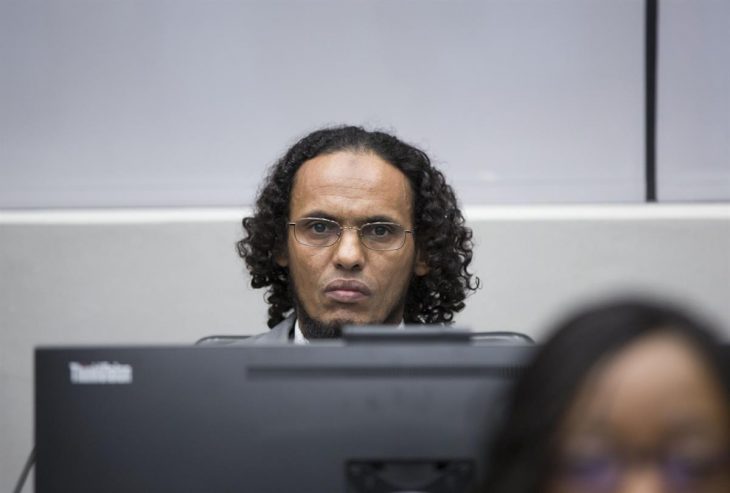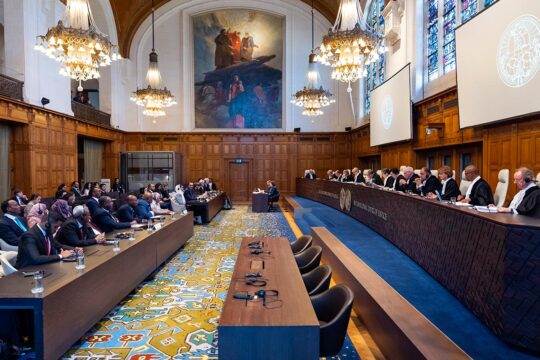War crimes judges jailed a Malian jihadist Tuesday for nine years for demolishing Timbuktu's fabled shrines, a landmark ruling seen as a warning that destroying mankind's heritage will not go unpunished. In the first such case to focus on cultural destruction as a war crime, the International Criminal Court found Ahmad al-Faqi al-Mahdi guilty of directing attacks on the UNESCO world heritage site during the jihadist takeover of northern Mali in 2012.
Mahdi "supervised the destruction and gave instructions to the attackers" who took pickaxes and bulldozers to the centuries-old shrines, presiding judge Raul Pangalangan told the tribunal.
"The chamber unanimously finds that Mr al-Mahdi is guilty of the crime of attacking protected sites as a war crime," he added, during an hour-long hearing at the tribunal based in The Hague.
ICC chief prosecutor Fatou Bensouda, whose office had asked for between nine and 11 years, said the sentence will signal to perpetrators that destroying cultural heritage is "a serious crime".
"It is a war crime and they will be held accountable for destroying these important sites," she told AFP.
Some 55 places around the world are on UNESCO's list of endangered cultural heritage sites.
Handed over to the ICC in late 2015, Mahdi, dressed in a sober grey suit and blue-striped tie, listened intently, but made no comment as sentence was passed.
The landmark verdict is also the first arising out of the conflict in Mali, and the first time a jihadist has sat in the dock.
In an unprecedented move, Mahdi, aged between 30 and 40, last month pleaded guilty to the single war crimes charge of "intentionally directing" attacks on nine of Timbuktu's mausoleums and the centuries-old door of the city's Sidi Yahia mosque.
The judges recognised the severity of the crimes targeting sites which "were dedicated to religion and historic monuments and were not military objectives".
But they also gave Mahdi credit for his guilty plea, his remorse and for his "substantial cooperation" with the prosecution.
- Evil spirits -
The slight, bespectacled man with a mop of curly hair had previously asked the pardon of his people when videos were shown of him and other Islamist extremists knocking down the earthen shrines.
Founded between the fifth and 12th centuries by Tuareg tribes, Timbuktu has been dubbed "the city of 333 saints" for the number of Muslim sages buried there.
Revered as a centre of Islamic learning during its golden age in the 15th and 16th centuries, it was however considered idolatrous by the jihadists who swept across Mali's remote north in early 2012.
As the head of the so-called Hisbah or "Manners Brigade," it was Mahdi, a former teacher and Islamic scholar, who gave the orders to ransack the sites.
Apologising last month at a court hearing, he said he had been overtaken by "evil spirits", urging Muslims not to follow his example.
The court found that Mahdi was a member of Ansar Dine, one of the Al-Qaeda-linked jihadist groups which seized northern territory before being mostly chased out by a French-led military intervention in January 2013.
- 'Strong message' -
The ruling "is a landmark in gaining recognition for the importance of heritage for humanity as a whole and for the communities that have preserved it over the centuries," UNESCO chief Irina Bokova said.
The UN cultural body also called it a "major step towards peace and reconciliation in Mali".
But there was concern that other crimes committed during the conflict have not yet been prosecuted.
The International Federation for Human Rights "would have liked to see broader charges including those of gender and sexual based crimes," said spokeswoman Carrie Comer.
Human Rights Watch said the ruling sent "a clear message that attacking the world's historical treasures will be punished".
But it also argued the "Malian government should follow suit and step up efforts to ensure investigations and fair trials for crimes committed by all sides."
And Amnesty International said it was a "first step towards broader accountability for all crimes" during the conflict.
Bensouda vowed her office was still investigating, saying "We are also looking into these crimes such as sexual and gender-based crimes and killings."






